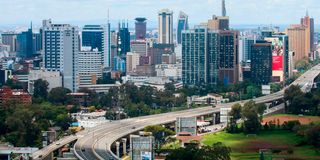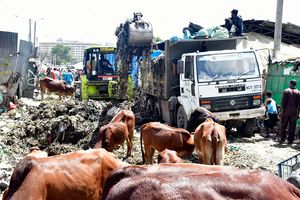
The Nairobi City Skyline on April 27, 2023.
The existence of powerful cartels, the prevalence of kickbacks, corruption and competing interests are key factors hindering the growth of Nairobi City and the resolution of colonial-era challenges such as congestion and urban planning.
A new report published by the Africa Cities Research Consortium, a think tank focusing on international development in certain African cities, shows that the 'powerful' cartels have taken over most of the city's service sectors, with county officials prioritising the interests of private developers over those of residents.
The cartels, according to the research, often enjoy rich political connections and collude with official service providers to frustrate residents seeking access to critical services such as water and electricity.
“In many informal settlements, water cartels create artificial scarcity and also can depend heavily upon collusion and corruption by county officials, as noted below: The Cartels disconnect water supplies to create an opportunity for them to provide the same commodity to the residents at a costly price… There are also illegal water connections by cartels. There is laxity by city county government to crack down on these cartels and criminal gangs. Most of these criminals receive protection from the politicians in the city,” reads the report launched on Friday, February 7.
The research carried out by 13 researchers belonging to the consortium—which is funded by UK aid from the United Kingdom government—also details the challenges city residents go through navigating the often-contested city roads due to a backlog in transport infrastructure.
It identified four domains of research including safety and security, structural transformation, health and nutrition.
They carried out desk reviews of quantitative, qualitative and spatial data; key informant interviews (KIIs); and focus group discussions (FGDs) with municipal officials, civil society organisations, private-sector actors, ordinary residents and donor agencies.
On the wanton corruption, the report details that the city has witnessed an influx of hazardous high-rise residences due to the ignorance of zoning plans and low-quality construction and irregular land allocations.
“There is often an uncomfortably close nexus between Kenyan politicians and real estate actors, including those who develop tenements, and many land investors collaborate with an array of authorities and private actors to sow chaos and stymie any efforts at official regulation.
Such biases in land administration are linked not only to Kenya’s patronage politics, meagre state capacity and powerful private interests but also to the practices of corrupt professionals like physical planners,” read the report.
The incorporation of climate change and infrastructure initiatives into the development of the city typically follows the lead of private developers, rather than advancing the public interest.
Reacting to the report, Dr Silvester Kasuku, an advisor on governance from the Executive Office of the President, called upon stakeholders to join hands in resolving challenges facing the city.
“There is a need to create sustainable cities which focus on improving the lives of the residents. This involves the implementation of among other initiatives a bus rapid transit system and the national and county government is committed to seeking solutions and partners to achieve this,” Dr Kasuku said during the launch of the report.
During the launch of the report in Nairobi, Dr Wale Akinyemi said there is a need for leaders to proactively think and come up with policies that prioritise the welfare of the residents and not those of small groups of ‘cartels’.
“The problem with most of the African cities is that we are too focused on the development of the physical infrastructure at the expense of creating a sustainable city. We are using the high-rise developments and roads as the indicators of development but that is not the case. We are living in delusion. There is need to transform and think proactively on resolving challenges for the future,” Dr Akinyemi said.
Nairobi faces a major backlog in its transport infrastructure, especially in the Eastlands area due to the rising congestion and lack of a functional mass system. Public transport has been neglected with Nairobi residents overwhelmingly relying on matatu (58.7 per cent), walking (17.1 per cent), motorbikes (3.9 per cent), with those on private cars a paltry 9.7 per cent.
The matatu sector within Nairobi is also faced with endemic bribery and corruption.
The relationship between the formal providers and informal non-state actors can markedly differ in their levels of conflict, collusion and harassment of the latter.
In the Eastlands areas, most of the streets remain unpaved and pedestrians face numerous challenges due to poor design and competing uses.
“Excessively narrow streets often force pedestrians to share the same space with motorists; many paths are also contested among informal businesses or other users. Even if adequate NMT infrastructure is available, motorcycles and cars often use walkways and cycle lanes, threatening NMT users’ safety,” read the report.
The report also shows that out of the total 803 health facilities in Nairobi County only 119, equivalent to 15 per cent, are owned by the public while the rest are owned by private providers, Non-governmental organisations (NGOs) and faith-based organizations.
The few public hospitals are facing acute shortages of drugs and staff making it difficult for residents to receive quality healthcare services.
As a solution to the challenges facing the city, the researchers recommend the involvement of the informal sector and the elimination of corruption to improve the delivery of government services.







